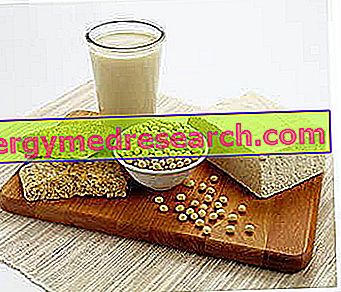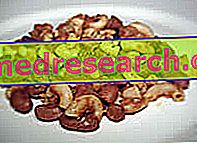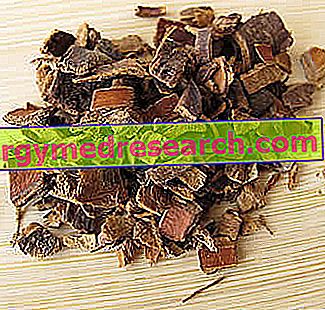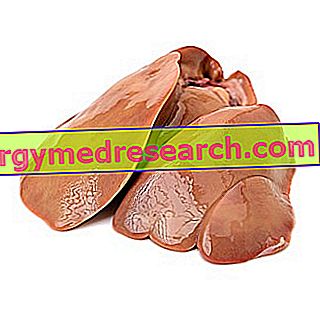Generality
The menopausal diet must be programmed taking into account all the physiological and paraphysiological changes that occur in the female organism.
The hormonal alterations that characterize menopause significantly change nutritional needs and risks to women's health; dietary planning in this period of life has the objective of completely complying with all the necessary needs, and of guaranteeing women a good state of general shape.
Calcium and Vitamin D

One of the most important (and also most known) disorders related to estrogen deficiency is the alteration of bone calcification which, if neglected (or in the presence of other risk factors), can lead to osteoporosis : in order to prevent its occurrence menopausal women can be given hormone replacement therapy .
At this point, once hormonal homeostasis is guaranteed, it is essential to ensure that the bone synthesis / remodeling ratio is not altered due to a mineral (calcium - Ca) and / or vitamin (Calciferol - vit. D) deficiency; in this regard, the diet in menopause plays a fundamental role.
In menopause, the dietary requirement of calcium - an essential mineral for the synthesis of hydroxyapatite in the skeleton - is 1200-1500mg / day, while that of vit. D is 10microg / day. In this regard it is appropriate that transitional women evaluate together with their doctor and / or nutrition specialist if, in addition to the diet for menopause and exposure to sunlight - useful for the endogenous synthesis of vit. D - it is appropriate to increase the intake of the mineral and calciferol through the intake of drugs or food supplements.
PLEASE NOTE
Estrogen replacement therapy (TOS) is recommended for reducing symptoms related to menopause and, as already explained, for reducing the risk of osteoporosis; it is however necessary to add that exogenous estrogens are able to also limit the increase in incidence of endometrial cancer (uterus) which is recorded in the case of HRT based on progestin alone; however, some experimental studies have shown that estrogen hormone therapy administered massively and for a long time can significantly increase the risk of breast cancer incidence. This possibility is influenced by numerous variables, such as the presence of other risk factors such as hypertriglyceridemia (see above) and the density of estrogenic receptors on breast tissue.
Fats and Cholesterol
No less important is the biochemical aspect linked to lipids, lipoproteins, and therefore to cardiovascular risk. In fact, it is known that throughout the fertility period estrogens play a sensibly protective role against blood vessels; these hormones act on the hepatic receptors of low-density lipoproteins (LDL) favoring their removal from the bloodstream and promoting the preservation of a good cardio-vascular system. However, as estrogen production decreases, a pathological increase in blood lipids may occur, consequently an increase in the risk of cardiovascular complications; in this regard, the diet in menopause must avoid:
- The increase in total blood cholesterol and especially LDL cholesterol
- The relative excessive weight gain of the visceral deposit (android type)
The menopausal diet must also consider that, as some studies show, one of the predisposing risk factors for breast cancer is represented by the increase in blood triglycerides. This means that, in addition to limiting exogenous cholesterol and saturated fats to prevent hypercholesterolemia, the type of food and the portion of foods with predominantly carbohydrate foods should also be carefully measured; this is because the tendency to hyperglycemia favors the synthesis of triglycerides, significantly increasing their blood concentration.
Phytoestrogens
Through nutrition it is NOT possible to significantly reduce the symptoms associated with the menopausal syndrome: hot flushes, night sweats, insomnia, anxiety, irritability, mood changes, memory shortages, reduced concentration and decreased sexual desire. However, the menopausal diet could positively assist drug therapy by ensuring a good supply of plant estrogens or phytosterols. These molecules, already known for their ability to reduce intestinal cholesterol absorption, can also simulate estrogenic action at the systemic level by calming (more or less sensitively) the symptoms related to menopause. Phytoestrogens are widely found in legumes (especially soy) and can also be found on the market in the form of food supplements (soy isoflavones, red clover, cimicifuga).
Iron
The only positive aspect linked to menopause, therefore to the interruption of the menstrual cycle, concerns the need for iron (Fe); with the annulment of blood loss linked to the mucosal exfoliation of the uterine endometrium, iron intake drops from 18mg / day for the fertile woman to 10mg / day for the menopausal woman.
What to eat
Read the article: Example Diet in Menopause »



